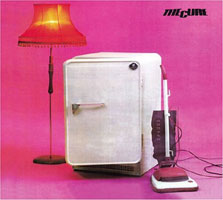 The Cure The Cure's first album is undeniably a first album, capturing a young band going through their initial batch of songs, most of which would just not seem all that good later on, given Robert Smith's prolific output and prodigious growth as a songwriter. Had it been the band's only record, it would be one of those punk-era gems that only graying record store geeks would hold onto and elitist college radio hosts would bother rediscovering. In the context of the Cure's total body of work, though, it's very much a minor-league effort. Since this was still a time when Brit bands didn't tend to include their singles on their LPs, Three Imaginary Boys lacks the sugar-rush of its American counterpart Boys Don't Cry, which included "Boys Don't Cry," "Jumping Someone Else's Train," and "Killing an Arab" (though it also dispensed with a couple of the cooler TIB tracks in favor of shoddier outtakes like "World War"). So the standouts are limited to "10:15 Saturday Night," "Fire in Cairo," "Accuracy," and the title cut, which is the clearest predictor of the band's moodier direction to come. The rest is all pretty good, though a bit stiff, and the songwriting ain't so good ("Meathook," "Object," "It's Not You" … not stuff you come away humming once the album's over). "Grinding Halt" is always nice to hear, as it's about as stock new-wave as the band ever got (it's quite similar to Shadowy Men on a Shadowy Planet, strangely enough). And the incompetent blues jam closer "The Weedy Burton" shows that, from the start, cheeky humor would always be part of the overall plan. Rhino's expanded reissue, with a full bonus disc of demos and outtakes, bumps things up nicely, though, offering a deliciously fuller portrait of the Cure's formative years. The additional material makes this release much more about the excitement of potential energy than about the strength of the songs. "Boys Don't Cry" and "Jumping" are both included, along with home and studio demos for all the best songs and some of the cult classics ("I'm Cold," "Heroin Face"). The organ-droney home demo for "10:15" is particularly awesome, and "The Cocktail Party" is almost like a blueprint for "Catch." Most curiously, "Killing an Arab" has been omitted entirely, which is quite odd considering it was such a keystone to their early set, was their most notorious single, and the early demos for it have been available on boots forever … one can only assume this is merely a stupid and fearful political decision, Rhino not wanting to dredge up the potential protest factor given the current world scenario. This is a serious disservice to fans, as it makes the set incomplete (though surely they'll include the song on a reissue of Staring at the Sea), and what's more, I'm not sure anyone who might still take misdirected offense at that song is in the target audience for $25 Cure remasters. That said, the material that is included, is wonderful, and the remastered sound quality is perfect. It's a great opportunity to hear this album freshly, and makes a crucial first step in building the case for the Cure being one of the four or five best rock bands of all time … seriously.
Review by Lumpy Ireland |